|
|
|
Sort Order |
|
|
|
Items / Page
|
|
|
|
|
|
|
| Srl | Item |
| 1 |
ID:
129029
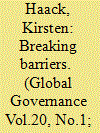

|
|
|
|
|
| Publication |
2014.
|
| Summary/Abstract |
The appointment of Christine Lagarde in 2011 to the leadership of the International Monetary Fund may have been a highlight for women's representation in international organizations, suggesting that the final glass ceiling for women in global governance has been broken. However, this article shows that leadership and representation by women in global governance continues to be curtailed by "glass walls" on the one hand, and flexible glass ceilings on the other. While women in UN agencies today stand on firmer floors, relying on a stronger institutional framework and increasing numbers of women working at all levels of the UN system, women are channeled into gender-specific portfolios, creating glass walls. Moreover, glass ceilings, once shattered, may indeed resettle as recent staff changes by Ban Ki-moon show. Thus, the picture of women's representation and gender equality in UN leadership is a mixed one.
|
|
|
|
|
|
|
|
|
|
|
|
|
|
|
|
| 2 |
ID:
129023
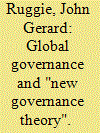

|
|
|
|
|
| Publication |
2014.
|
| Summary/Abstract |
On 16 June 2011, the un human rights council unanimously endorsed the Guiding Principles on Business and Human Rights that I developed over the course of the previous six years in my role as the Secretary-General's special representative for business and human rights.1 The journey involved nearly fifty international consultations on five continents, numerous site visits to individual firms and local communities, extensive research, and pilot projects to road test key proposals. For the council and its institutional predecessor, the Commission on Human Rights, the endorsement was unprecedented. It was the first time that the UN adopted a set of standards on the subject of business and human rights; and it remains the only time the commission or council endorsed a normative text on any subject that governments did not negotiate themselves. Moreover, the uptake of the Guiding Principles (GPs) by other standard-setting bodies, national and international, has been swift and widespread, as has their use as a policy template by companies and business associations as well as an advocacy tool by nongovernmental organizations (NGOs) and workers' organizations.2
|
|
|
|
|
|
|
|
|
|
|
|
|
|
|
|
| 3 |
ID:
129026
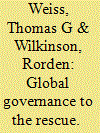

|
|
|
|
|
| Publication |
2014.
|
| Summary/Abstract |
International relations teeters on the edge of an abyss of irrelevance. As an academic pursuit, it has become disparate and fragmented. Those of us in the discipline have ceased to pursue greater clarity in the way that we understand the world around us. Moreover, we have failed as agents of change; that is, as purveyors of opinion and proposals about a better and fairer world order. As such, we no longer serve our students and those practitioners who seek our advice, or, for those of us who take on policy jobs, to push out the envelope of what is considered acceptable. Global governance offers one potentially compelling way of "saving international relations"- though it is not without its problems. This article outlines how and why. The argument unfolds in three parts. The first outlines why and how IR teeters on the edge of an abyss. The second offers a proposal for moving beyond the fragmentation and atomization that afflicts international relations. We suggest that one way of encouraging reengagement is to return to debating grand questions that used to be the sustenance of IR. The third part argues that global governance-appropriately and specifically framed to make it fit for purpose-offers an opportunity to return to these questions and, in so doing, reinvigorate our fragmented and atomized field.
|
|
|
|
|
|
|
|
|
|
|
|
|
|
|
|
| 4 |
ID:
129038
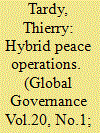

|
|
|
|
|
| Publication |
2014.
|
| Summary/Abstract |
Hybridity is the new term for multidimensional, modular, and multiactor peace operations. Hybrid peace operations bring together several institutions that to an extent cooperate in a joint endeavor. This article aims at unpacking the concept of hybridity by looking at its rationale and challenges. It first examines the typology of peace operations and analyzes the meaning of hybridity. It then looks at why international organizations have hybridized their conflict management policies and contends that further integration is the way forward for legitimacy and efficacy reasons, despite the difficulties encountered by existing hybrid missions. Finally, the article looks at some of the challenges of an increasing integration of institutional actors within peace operations. While integration is a response to the evolution of conflict management needs, it also carries risks ranging from interinstitutional competition to issues of accountability and ownership as well as impacts on the coherence of the global maintenance of international peace and security.
|
|
|
|
|
|
|
|
|
|
|
|
|
|
|
|
| 5 |
ID:
129043
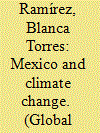

|
|
|
|
|
| Publication |
2014.
|
| Summary/Abstract |
During the first decade of this century, Mexico showed increasing activism on climate change. It strongly supported working within the United Nations system, convinced that this is the best path to confront the problem. It also participated in smaller, informal forums dealing with this vital but divisive issue. Mexico was more successful in its efforts to contribute in rebuilding the capacity of the multilateral system at this crucial moment than it was in its attempts to become a bridge between developed and developing countries, while some of the latter saw it leaning far toward the developed world.
|
|
|
|
|
|
|
|
|
|
|
|
|
|
|
|
| 6 |
ID:
129020


|
|
|
|
|
| Publication |
2014.
|
| Summary/Abstract |
THE KEY INSIGHT EXPRESSED IN THE STRIKING WORDS OF THE BRUNDTLAND Commission-"The Earth is one but the world is not"1-remains as relevant a political statement about most global governance challenges today as it was about sustainable development twenty-seven years ago. Global governance entails multilevel and networked relations and interactions for managing and facilitating linkages across policy levels and domains. It consists of formal and informal arrangements that provide more order and stability for a world in constant and rapid flux than would occur naturally-the range of international cooperation without a world government. Intensifying global interdependence, growing recognition of problems that defy solutions by a single state or organization, and increasing numbers and importance of nonstate actors have all contributed to the growth of global governance as an analytical framework.
|
|
|
|
|
|
|
|
|
|
|
|
|
|
|
|
| 7 |
ID:
129041


|
|
|
|
|
| Publication |
2014.
|
| Summary/Abstract |
Regime complexes or overlapping regimes relating to a common subject matter create policy coherence challenges at the national level. Recent research has observed a positive correlation between regime complexes and policy coherence: improved regime integration enables greater policy coherence and vice versa. Policy coherence has nonetheless been approached as a problem of foreign policy and not yet as a problem of public policy. This article examines the coevolution of regime complexes and (public) policy coherence in the context of international biodiversity governance, with a focus on the cluster of biodiversity-related conventions and their implementation in countries of Latin America and the Caribbean. It shows that global synergies in the biodiversity cluster have advanced more rapidly than national coordination of implementation activities. Feedback loops between governance levels have not been strong enough to bridge that gap. The article concludes that more symmetrical evolutions require deliberate cross-level management.
|
|
|
|
|
|
|
|
|
|
|
|
|
|
|
|
| 8 |
ID:
129032
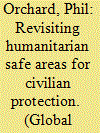

|
|
|
|
|
| Publication |
2014.
|
| Summary/Abstract |
Are safe areas an effective option to protect civilian populations from mass atrocities when they are targeted by their own state? Safe areas disappeared from the international lexicon following the failures in Bosnia and Rwanda. But they are now receiving a second look as a way of responding to mass atrocities without full-scale military intervention. This article argues that the earlier generation of safe areas failed not due to their size or cost, but rather because of problems inherent with their underlying logic. Safe areas were based either on logics of consent or the presence of a credible military force. Hybrid safe areas (such as in Bosnia) were based on neither of these, but instead relied on the legitimacy inherent in the UN Security Council. Crucially, in cases where civilians were being directly targeted by belligerents, both hybrid and consent-based safe areas collapsed. This has direct ramifications for present discussions around the Protection of Civilians agenda and the Responsibility to Protect doctrine.
|
|
|
|
|
|
|
|
|
|
|
|
|
|
|
|
| 9 |
ID:
129035
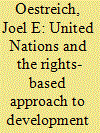

|
|
|
|
|
| Publication |
2014.
|
| Summary/Abstract |
This article examines how various United Nations agencies are implementing a rights-based approach to development in India. It argues that, while most studies of RBA focus on the promotion of economic, social, and cultural rights through this approach, civil and political rights are also integral to UN efforts. This is important because it suggests a new, more cooperative mode of promoting human rights as an alternative to traditional New York- and Genevabased mechanisms. The article explains how rights are being promoted. It also lays out some strategies that UN bodies use to circumvent host state resistance to outside interference on human rights. Finally, it suggests a course for future rights promotion through these mechanisms.
|
|
|
|
|
|
|
|
|
|
|
|
|
|
|
|
|
|
|
|
|